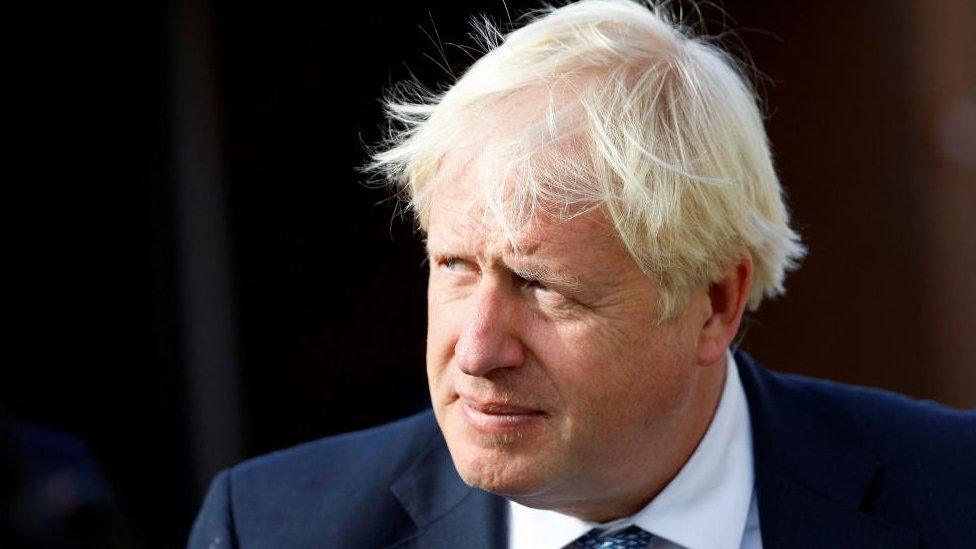Deputy PM: It's still legal for UK to sell arms to Israel
- Published
Watch: Israel is conducting a legitimate campaign, says Deputy PM Oliver Dowden
The deputy prime minister has told the BBC he believes it is still legal for the UK to continue to sell arms to Israel.
There have been calls for the UK to stop arming Israel after seven aid workers were killed in Gaza this week.
Oliver Dowden suggested the UK would stop supplying weapons to Israel if it was found to be in breach of international law.
But Mr Dowden insisted Israel was conducting a "legitimate" war.
Meanwhile, Labour is calling on Foreign Secretary David Cameron to face questions from MPs on the legal advice he has received on the issue.
Israel faced criticism from allies this week after an Israel Defense Forces (IDF) unit attacked a convoy of World Central Kitchen vehicles from the air, killing seven people including three British military veterans.
When asked on the BBC's Sunday With Laura Kuenssberg whether Israel was acting within the law, the deputy prime minister said advice on UK arms sales had not changed.
However, Mr Dowden's advisers later clarified he was referring specifically to the advice Lord Cameron gives to business secretary Kemi Badenoch about arms sales, rather than independent legal advice.
Israel was "still facing this existential threat from Hamas" and was "prosecuting a legitimate war of self-defence", Mr Dowden said.
"The key thing is, 'is it legitimate, can we lawfully sell arms to Israel?' and yes, that is the case and on that basis... that position has not changed," he said.
"We will of course act in accordance with our obligations under law in respect of arms sales."
Earlier this week, former Supreme Court justices were among 600 lawyers who wrote to the government saying weapon exports to Israel must end because the UK risks breaking international law over a "plausible risk of genocide" in Gaza. Israel rejects the claim of genocide as "wholly unfounded".
On Friday, the Conservative chair of the Foreign Affairs Select Committee, Alicia Kearns, told BBC Radio 4's Today programme that the UK had "no choice" but to suspend arms sales to Israel.
Mr Dowden was asked about Ms Kearns' claims the government had received legal advice, external which said Israel had broken international humanitarian law, although this was advisory only.
The deputy PM did not directly deny the claims, saying the government would not publish legal advice it had received and that he was "cautious about getting into individual details".
Watch: Government needs to explain legal advice on arms sales - Lord Mark Sedwill
Mr Dowden said the UK had "specific concerns" about Israel's conduct over access for aid workers and civilian deaths and "Israel has engaged with those".
He also hit out at "the kind of relish" he said some were taking in criticising Israel, saying they were "holding Israel to standards we wouldn't remotely hold other countries to".
He said it was "all too easy" for the world to forget "the horrors of six months ago", when Hamas launched its deadly cross-border attacks on 7 October. About 1,200 people were killed and 253 hostages seized.
Since then, more than 33,000 people have been killed in Gaza, according to the Hamas-run health ministry, while about 129 Israeli hostages are still missing, with 34 presumed dead.
On Sunday, Prime Minister Rishi Sunak marked six months since the attack by saying "the whole of the UK is shocked by the bloodshed" and called for a "humanitarian pause" to allow aid to reach civilians in Gaza.
Lord Cameron has warned that UK support for Israel's right to self-defence is "not unconditional" and Israel is expected to abide by international humanitarian law.
However, in a column in the Sunday Times, external, Lord Cameron also suggested arms sales should continue as "so far Hamas has said no" to a deal for a pause in the fighting.
He said: "We must all continue to work towards this aim, but I believe that failing to prepare for continued conflict will lead to further suffering and avoidable loss of innocent lives.
"The UK stands ready to play its part."
'Even if it's lawful, is it right?'
Labour's shadow foreign secretary David Lammy has written to the government calling on the foreign secretary, who as a peer would normally be questioned in the House of Lords, to come to the House of Commons so MPs can question him over the legal advice on UK arms exports to Israel.
Mr Lammy said he had "very real concerns that our obligations according to international humanitarian law... might have been breached".
"It's hugely important that the UK is not complicit in a breach of international law," he said, adding: "I remain concerned until I have seen that advice."
There are ethical as well as legal questions, said Lord Mark Sedwill, who was the UK's top civil servant before leaving to become a non-executive director at BAE Systems, which is linked to arms sales in Israel.
"There's a separate question," he said. "Even if it's lawful, is it right to continue these arms sales?
"Can they be used to extract some kind of leverage over Israel about the way they're conducting this campaign?
"David Cameron's remarks about our support being not unconditional I think hints that he is thinking in those terms."
Backing Mr Lammy's call for the government to share legal advice with the public, Labour's Baroness Amos urged them to "publish it and get it over with", as the Labour government had eventually done with advice over the Iraq War when she was in the cabinet.
She said: "The public want to see the legal advice because they have lost trust in the government and what the government is saying."
Related topics
- Published7 April 2024

- Published6 April 2024

- Published6 April 2024
